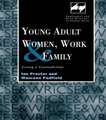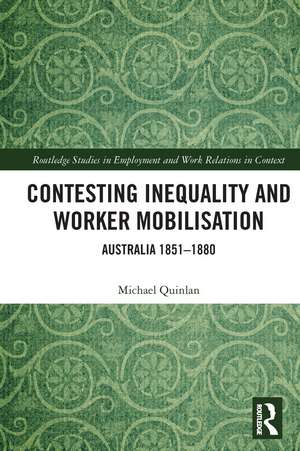Contesting Inequality and Worker Mobilisation: Australia 1851-1880: Routledge Studies in Employment and Work Relations in Context
Autor Michael Quinlanen Limba Engleză Paperback – 29 apr 2022
The author’s 2018 Origins of Worker Mobilisation examined the beginning of worker organisation, arguing inequality at work, and regulatory subordination of labour, drove worker resistance, initially by informal organization that slowly transitioned to formal organisation. This new volume analyses worker mobilisation in the period 1851-1880, drawing data from a unique relational database recording every instance of organisation. It assesses not only the types of organization formed, but also the issues and objectives upon which mobilisation was founded. It examines the relationship between formal and informal organisation, including their respective influences in reshaping working conditions and the life-circumstances of working communities. It relates the examination of worker mobilisation to both historical and contemporary contexts and examines mobilisation by different categories of labour. The book identifies important effects of mobilisation on economic inequality, hours of work (including the eight-hour day and the beginnings of the weekend) and the development of democracy.
It will be of interest to researchers, academics, and students in the fields of social mobilisation, social and economic history, industrial relations, labour regulation, labour history, and employment relations.
| Toate formatele și edițiile | Preț | Express |
|---|---|---|
| Paperback (1) | 259.98 lei 6-8 săpt. | |
| Taylor & Francis – 29 apr 2022 | 259.98 lei 6-8 săpt. | |
| Hardback (1) | 1000.27 lei 6-8 săpt. | |
| Taylor & Francis – 11 aug 2020 | 1000.27 lei 6-8 săpt. |
Din seria Routledge Studies in Employment and Work Relations in Context
-
 Preț: 393.56 lei
Preț: 393.56 lei -
 Preț: 310.75 lei
Preț: 310.75 lei -
 Preț: 311.41 lei
Preț: 311.41 lei -
 Preț: 310.70 lei
Preț: 310.70 lei -
 Preț: 416.22 lei
Preț: 416.22 lei -
 Preț: 383.12 lei
Preț: 383.12 lei - 15%
 Preț: 462.74 lei
Preț: 462.74 lei - 12%
 Preț: 298.41 lei
Preț: 298.41 lei -
 Preț: 438.86 lei
Preț: 438.86 lei -
 Preț: 412.37 lei
Preț: 412.37 lei -
 Preț: 417.20 lei
Preț: 417.20 lei - 15%
 Preț: 672.58 lei
Preț: 672.58 lei - 18%
 Preț: 999.51 lei
Preț: 999.51 lei - 17%
 Preț: 259.10 lei
Preț: 259.10 lei - 25%
 Preț: 499.81 lei
Preț: 499.81 lei -
 Preț: 482.35 lei
Preț: 482.35 lei - 18%
 Preț: 898.57 lei
Preț: 898.57 lei -
 Preț: 483.49 lei
Preț: 483.49 lei - 25%
 Preț: 712.09 lei
Preț: 712.09 lei -
 Preț: 451.32 lei
Preț: 451.32 lei - 16%
 Preț: 241.15 lei
Preț: 241.15 lei - 15%
 Preț: 687.11 lei
Preț: 687.11 lei - 15%
 Preț: 674.24 lei
Preț: 674.24 lei -
 Preț: 389.66 lei
Preț: 389.66 lei - 13%
 Preț: 297.57 lei
Preț: 297.57 lei - 18%
 Preț: 1000.27 lei
Preț: 1000.27 lei - 26%
 Preț: 179.10 lei
Preț: 179.10 lei -
 Preț: 489.26 lei
Preț: 489.26 lei - 26%
 Preț: 1017.18 lei
Preț: 1017.18 lei -
 Preț: 462.25 lei
Preț: 462.25 lei -
 Preț: 389.66 lei
Preț: 389.66 lei -
 Preț: 416.22 lei
Preț: 416.22 lei - 18%
 Preț: 1001.55 lei
Preț: 1001.55 lei
Preț: 259.98 lei
Preț vechi: 311.41 lei
-17% Nou
Puncte Express: 390
Preț estimativ în valută:
49.75€ • 52.07$ • 41.41£
49.75€ • 52.07$ • 41.41£
Carte tipărită la comandă
Livrare economică 31 martie-14 aprilie
Preluare comenzi: 021 569.72.76
Specificații
ISBN-13: 9780367537258
ISBN-10: 0367537257
Pagini: 340
Ilustrații: 8
Dimensiuni: 152 x 229 mm
Greutate: 0.45 kg
Ediția:1
Editura: Taylor & Francis
Colecția Routledge
Seria Routledge Studies in Employment and Work Relations in Context
Locul publicării:Oxford, United Kingdom
ISBN-10: 0367537257
Pagini: 340
Ilustrații: 8
Dimensiuni: 152 x 229 mm
Greutate: 0.45 kg
Ediția:1
Editura: Taylor & Francis
Colecția Routledge
Seria Routledge Studies in Employment and Work Relations in Context
Locul publicării:Oxford, United Kingdom
Public țintă
PostgraduateCuprins
1. The Collective Impulse, Mobilisation and Political Economy. 2. Overview of Organisation, Methods and Patterns of Struggle. 3. Transport and Maritime Activities. 4. Worker Organisation in Agriculture and Rural Industry. 5. Mining. 6. Worker Organisation in Building and Construction. 7. Metal/Engineering, Printing and Transport Equipment. 8. Apparel, Footwear, Food/Beverages and other Manufacturing. 9. Retailing/Warehouses, Hospitality, Commercial and Personal Services. 10. Workers in Government and Community Service. 11. Wider Alliances, Peak-Union Bodies and Political Organisation. 12. Concluding Observations.
Notă biografică
Michael Quinlan is emeritus professor of industrial relations, University of NSW and adjunct professor School of History and Humanities, University of Tasmania.
Recenzii
“Imaginative. Precise. Easy to read. Informative. Insightful. All these are apt descriptions of this book. Yet, they do not do it justice. It is work which constitutes a major contribution to scholarship and policy-making. It does so by inviting, no, by forcing, mainstream scholars and policy-makers to re-think their starting positions… This is a book which should be read by all of us who are students of, and activists in, capital–labour relations. We will profit in the best way: we will be enriched intellectually and, perhaps, inspired to do better.” Harry Glasbeek, York University, Canada
Descriere
Contesting Inequality and Worker Mobilisation: Australia 1851-1880 provides a new perspective on how and why workers organise, and what shapes that organisation.
